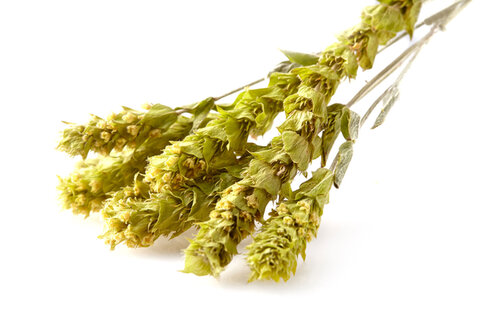KEYWORDS
Concental
Branded ingredient
Sideritis species
Abstract
Menopause, its symptoms, and suggested solutions are hitting the headlines as women look for alternative dietary supplements. This is commercially relevant because women spend over $13 billion annually on treating menopause symptoms according to AARP(1).
Further, FMCG Gurus (2) reports that "[post-menopausal] women often feel there is a lack of non-prescription products to help them deal with related daily issues.“
Research conducted and reviewed in the medical journal Lancet (3) indicates that while it is important not to minimise the impact of HRT and its role in managing symptoms such as night sweats and hot flushes, there is room for new approaches that could impact state anxiety as a typical symptom of perimenopause and menopause.
This thought leadership article highlights the growing demand for herbs and botanicals that could positively impact the symptoms of menopause including anxiety, brain fog, and muscle loss.
Menopause is a normal part of aging, but for some women, it can usher in a period of profound change and transition.
While the majority of women will experience some form of hot flush, insomnia, moodiness, irritability, depression, and anxiety, it is important to remember that each woman’s experience is different. This must be reflected in how they choose to treat or deal with their unique set of symptoms – whether opting for traditional hormone replacement therapy or when investigating alternative treatments including dietary supplements and nutraceuticals.(4)

Time to normalise menopause
In the past, the symptoms associated with perimenopause, menopause, and post-menopause were often unreported or disparaged as a period when women behaved irrationally, gained weight, and generally became unpredictable in their moods and actions.
But, as our understanding of all the stages of menopause grows, there is increasing backlash from the women’s health fraternity against this type of stereotyping.
In a recent article in the UK newspaper TheGuardian, Professor Martha Hickey, chair of obstetrics and gynaecology at the University of Melbourne in Australia was quoted as saying that there are concerns about the media’s tendency to focus on extremely negative experiences of menopause. She noted that menopause is often depicted as an unfortunate and distressing experience, which can only be resolved with hormone replacement therapies.(5)
While general conversations about how people experience menopause have begun to permeate mainstream media, awareness, and education still have a long way to go.
In particular, there is a need for further understanding of how the body and cognitive functions can change during menopause.
What we do know is that during this period, the body metabolises and uses energy differently, fat cells change, resulting in weight gain, and there are significant changes to bone and heart health, body shape, physical function, and composition. Critically, this period can also contribute to hormonal imbalances that can directly influence anxiety and symptoms of depression.(6)
While open discussions around menopause are slowly becoming more widespread, there is a long way to go. Like many taboo subjects, there is a critical need to normalise the symptoms of menopause and to actively look for solutions to assist women during this normal life stage.
There are currently 48 recognised symptoms of menopause. Menstruators experience an average of seven of these over a period that can last between four to 12 years. There is no prescribed ’menopause experience’ and not everyone ends up with hot flushes and mood swings.(7)
No reason to discriminate
The article in The Guardian also highlighted that there could be a commercial interest in portraying menopause as a medical problem, leaving women inundated with misinformation and pushed towards treatment that might not be the right fit for them.(8)
Furthermore, a series of papers in the international medical journal Lancet has prompted doctors and researchers to jointly call for a societal shift that could challenge these often inaccurate assumptions.(9)
While the paper argued that HRT products should be available to those women who need them, evidence supports that it is only effective for hot flashes and night sweats. Impartial information is therefore vital to offer balanced treatment options without the risk of undue influence and by stressing an evidence-based approach.
The series of papers concluded that there is an urgent need for greater awareness, new treatment, and additional support for people who experience menopause or who are at higher risk of depression or anxiety during perimenopause.(10)
This makes menopause a challenging issue in healthcare, but an exciting field of study in the life sciences sector, particularly when it comes to developing product solutions based on natural and plant-based ingredients, including botanicals.

Hormonal anxiety
Hormonal changes experienced during menopause could have a direct impact on the body’s nervous system, which could lead to a series of psychological manifestations.
“These changes are caused by radical hormonal changes that can affect the mood of some women. This is why we speak of hormonal anxiety. When hormone levels are very high or low, they can affect the brain’s neurotransmitters, causing certain issues such as increased anxiety,” Dr Cynthia Suarez Rizzo, project manager of new product development at Finzelberg explains.
This is because the chemical processes in the reproductive system and the brain affect mood and predispose women to this feeling of nervousness, tension, or worry.
“Anxiety is a state of intense worry and fear that can manifest at any time in our lives. Although each woman is different, as are her circumstances, the symptoms of menopause could vary from six months to two or three years.
“Women are more vulnerable to anxiety than men, and the prevalence of anxiety is twice that of men. It was observed that menopause is a time when psychological symptoms increase, as well as the risk of developing major depression and anxiety disorders,” Dr Suarez Rizzo says.

Exploring natural solutions
As consumers and menopause wellness advocates look for alternatives to traditional products including HRTs’ product developers and formulators of natural dietary supplements and nutraceuticals are increasingly invested in exploring natural solutions. These include making use of select herbs and botanicals that could impact the symptoms of menopause. Of particular interest is:
- Black Cohosh (Cimicifuga racemosa)
Commonly used to treat menopausal symptoms, including mood swings and anxiety, Black Cohosh is a favourite study subject. In the past, extracts of the rhizome of C. racemosa were traditionally used for a variety of female complaints during childbirth, and in the treatment of uterine colic and dysmenorrhea. Research now indicates that it may be effective in reducing anxiety and depressive symptoms associated with menopause.(11)
During studies conducted on its mechanism of action, Ruhlen et al indicated that extracts of Black Cohosh were demonstrated effective for up to three months in most clinical trials, although the mechanism by which BCE relieves symptoms is still unclear.(12)
As many menopausal symptoms, including hot flashes, mood swings, anxiety, and insomnia are mediated through the central nervous system (CNS) these symptoms may be alleviated through a variety of mechanisms. It is possible that Black Cohosh can act via multiple tissue-dependent mechanisms, including estrogenic (or antiestrogenic), serotonergic, antioxidative, and inflammatory or anti-inflammatory.
The role of specific chemicals or classes of chemicals, i.e. triterpenes, should furthermore be examined in these systems to determine physiological relevance. Since many of the post-menopausal symptoms are thought to arise from the CNS, more studies are needed to find out if specific Black Cohosh components can cross the blood-brain barrier and exert effects to regulate the CNS thermoregulation system. Research is also ongoing to ascertain whether menopausal symptoms can be alleviated by selective serotonin reuptake inhibitors (SSRIs), which would suggest that Black Cohosh may work through a serotonergic mechanism. (12)
- Rhodiola (Rhodiola rosea)
Rhodiola is another herb with a long history of traditional use as an adaptogen for enhancing mental and physical performance and for its stress-protective effects. Research has shown that cultivated rhodiola can improve many of the neuropsychological symptoms experienced by menopausal women, including fatigue, anxiety, depression, stress intolerance, cognitive dysfunction, memory decline, and reduced executive functions.(13)
In an open-label, randomised trial, Cropley et al. demonstrated that participants suffering from mild anxiety responded positively to R. rosea. (13) Stress and anxiety significantly decreased in the R. rosea treatment group during the 14-day intervention. Measures of total negative mood, anger, confusion, and depression were also significantly decreased in the R. rosea group. The results indicated that people suffering from mild anxiety significantly benefited from R. rosea, while the herb also showed a protective effect against depression. (14)
Botanical expert Finzelberg’s latest metabolomic studies also reveal startling impacts on the biological activity of their cultivated Rhodiola, including the promotion of both physical and mental resilience to help the body and mind adapt to stress while maintaining optimal performance. (15)
Cultivated Rhodiola extracts have been shown to increase the concentration of polyamines such as spermidine in muscle cells, which is currently a focal point in longevity research.
Unlike external spermidine supplements that struggle to reach effective intracellular concentrations, Rhodiola extract can enhance spermidine levels directly within cells, potentially offering a valuable contribution to longevity. This, combined with its proven ability to modulate muscle health, positions cultivated Rhodiola as a powerful ally in promoting healthy aging and supporting longevity.(15)
“We are planning to confirm these promising results on muscle health in a clinical, double-blind, placebo-controlled study”, says Martin Felkner.
“This study aims to validate the efficacy of Rhodiola in supporting both physical and cognitive health, specifically targeting elderly individuals who have been physically inactive. Mentally, inactive individuals often face quick demotivation after beginning new activities, and this study aims to address this challenge by demonstrating the benefits of Rhodiola in sustaining both physical and mental engagement. We believe that this research will further solidify the role of Rhodiola as a key ingredient for healthy aging and improved quality of life,” he says.
- Sage (Salvia officinalis)
Sage has been traditionally used to manage menopausal symptoms in treating hot flushes and other menopausal complaints.(16) Recent studies have shown that fresh Sage extract can positively affect the brain, helping to relieve emotional symptoms such as brain fog and anxiety during menopause and reduce emotional dysfunction - those rollercoaster emotions women can experience during times of hormonal fluctuation. (17)
Study subjects were also given a complete electronic encephalogram (EEG) before and after the Sage treatment, to explore any changes in cerebral neuronal activity by the treatment.
An EEG measures electrical activity in the brain. At each EEG, subjects undertook a range of tests such as reading, concentration, and memory tests.
Analysis of the EEG results showed that fresh Sage extract normalised the excitability of various brain waves under stressful conditions including exposure to mental challenges, smoothing them out to provide a more balanced mood. This 'electric blueprint' was a further confirmation of the clinically observed improvement of mood and mental capacity with fresh Sage extract. Published in Heliyon, the double-blind, randomised, placebo-controlled clinical trial showed fresh Sage leaf extract can provide an effective and natural alternative for women who are unable or unwilling to take conventional hormone replacement therapy. (18)
- Sideritis species (Sideritis spp.)
Dietary supplements containing a high percentage of Sideritisspecies extracts are showing great results and numerous positive effects when dealing with anxiety states including those experiences during menopause.
A recent study with Greek Mountain Tea Extract (Sideritis), was conducted at the Brain Performance and Nutrition Research Centre (BPNRC) at Northumbria University in the UK.(19)
“The study was used as a platform to do a data analysis considering a subgroup of women from 50 to 70 years old and to investigate the effectiveness of the branded ingredient containing high concentrations of Sideritis against anxiety,” Dr Suarez Rizzo says.
Generally, women between the ages of 45 and 59, are considered in a menopausal transition period, while women over the age of 60 are considered as post-menopausal.
“In this specific analysis, women between 50 and 59 were considered to be in menopause and from 60+ in post-menopause. In the study of anxiety, there are two complementary concepts: a psychophysiological state (state anxiety) and a personality trait (trait anxiety).
State anxiety reflects the psychological and physiological transient reactions directly related to adverse situations at a specific moment.
“Typical examples of state anxiety are when we are faced with a challenging situation at work, before taking a test, or before making an important decision. While the original final dataset was 142 persons, a sub-analysis was performed for a women subgroup with 85 females for mood analysis,” Dr Suarez Rizzo notes.
“In an initial study from Wightman et al. (20) with Sideritis extract vs placebo, we could see that relative to the placebo control, 950mg of the branded ingredient evinced significantly reduced state anxiety following 28 days of consumption.”
“But after the actual analysis in the Northumbria study, we observed that the branded ingredient verum group containing Sideritis in comparison to the placebo group has a positive effect with 475mg after 28 days, reducing the state anxiety in all women groups.” (21)
“The verum group showed bigger improvements (up to 19%) compared to placebo in the group of 50-60 years old with a 475mg dose. While in the group over the age of 60 the higher dosage seems to be more effective (up to nearly 12%). As the age of the women and/or the period of menopause influences the level of anxiety, different concentrations may provide benefits to these two groups in particular,” Dr Suarez Rizzo points out.
Promising solutions
With the jury still out on the exact physical and cognitive changes that occur during the menopausal experience, dietary supplement manufacturers and brands will continue to look for active ingredients and compounds that offer women a natural and effective tool to cope with menopause-induced anxiety and depression. Here, the active compounds found in select herbs and botanicals, including Rhodiola, Sideritis species, Sage, and Black Cohosh might just hold the answer.
References and notes
- Menopause in the Workplace Has an Economic Impact
- FMCG Gurus
- Menopause 2024
- What Is Menopause? | National Institute on Aging (nih.gov)
- Companies portray menopause as ‘medical problem’ and push women towards ineffective treatments, papers find | Health | The Guardian
- What Is Menopause? | National Institute on Aging (nih.gov)
- https://gen-m.com/signs/
- Companies portray menopause as ‘medical problem’ and push women towards ineffective treatments, papers find | Health | The Guardian
- Menopause 2024 – Lancet – accessed November 2024
- The acute and chronic cognitive and cerebral blood flow effects of a sideritis scardica (Greek mountain tea) extract: A double blind, randomized, placebo controlled, parallel groups study in healthy humans — Northumbria University Research Portal
- Black cohosh (Cimicifuga racemosa) for menopausal symptoms: A systematic review of its efficacy - ScienceDirect
- Black Cohosh: Insights into its Mechanism(s) of Action - PMC
- Cropley M, Banks AP et al. The effects of Rhodiola rosea extract on anxiety, stress, cognition and other mood symptoms. Phytother Res. 2015 Dec; 29(12):1934-9
- The Effectiveness of Rhodiola rosea L. Preparations in Alleviating Various Aspects of Life-Stress Symptoms and Stress-Induced Conditions—Encouraging Clinical Evidence - PMC
- Controlled Cultivation Confers Rhodiola rosea Synergistic Activity on Muscle Cell Homeostasis, Metabolism and Antioxidant Defense in Primary Human Myoblasts
- First time proof of sage's tolerability and efficacy in menopausal women with hot flushes - PubMed
- The effect of Salvia officinalis extract on symptoms of flushing, night sweat, sleep disorders, and score of forgetfulness in postmenopausal women - PubMed
- Tackle Menopausal Brain Fog with the herb Sage
- The acute and chronic cognitive and cerebral blood flow effects of a sideritis scardica (Greek mountain tea) extract: A double blind, randomized, placebo controlled, parallel groups study in healthy humans — Northumbria University Research Portal
- The acute and chronic cognitive and cerebral blood flow effects of a sideritis scardica (Greek mountain tea) extract: A double blind, randomized, placebo controlled, parallel groups study in healthy humans — Northumbria University Research Portal
- The acute and chronic cognitive and cerebral blood flow effects of a sideritis scardica (Greek mountain tea) extract: A double blind, randomized, placebo controlled, parallel groups study in healthy humans — Northumbria University Research Portal




